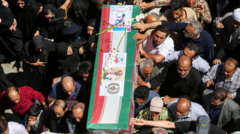Why Do I Tell My Kids Not to Play to Save on Soap?

The Cost of Living Crisis in Malawi: A Deep Dive into Economic Challenges and Solutions
The cost of living crisis in Malawi has reached alarming levels, particularly affecting the country's most vulnerable populations. Individuals like Suzanna Kathumba, a domestic worker in Lilongwe, are grappling with skyrocketing inflation and stagnant wages, leading to dire economic circumstances. This article explores the multifaceted causes of this crisis, its impact on the population, and potential solutions to alleviate these challenges. We will also delve into the broader implications for Malawi's economy and its future prospects.
Understanding the Economic Landscape
Malawi, a landlocked country in southeastern Africa, is known for its agriculture-based economy. Unfortunately, it has faced a series of economic challenges that have resulted in one of the highest inflation rates in Africa. As of May 2023, the annual inflation rate stood at a staggering 27.7%. The situation is exacerbated by various factors, including limited foreign exchange reserves, high import costs, and a lack of economic diversification.
Inflation: A Growing Concern
The inflation rate in Malawi has been a source of significant concern for economists and everyday citizens alike. The cumulative inflation over three years has surpassed 100%, pushing the country into what is considered a "hyperinflationary economy." This term refers to a situation where prices increase rapidly, leading to a decline in purchasing power. The Ernst & Young report highlights that Malawi ranks alongside countries like Venezuela and Zimbabwe in this regard, underscoring the severity of the issue.
Stagnant Wages Amid Rising Costs
As inflation continues to rise, many workers in Malawi find their salaries failing to keep pace with the cost of living. For individuals like Suzanna Kathumba, who earns 80,000 kwacha (approximately $46) a month, the financial strain is palpable. With basic necessities becoming more expensive, Ms. Kathumba and many others are left scrambling to make ends meet. The reality is grim: as prices rise, the purchasing power of wages falls, leading to a cycle of poverty that is difficult to escape.
The Burden of Daily Life
Every day, Malawians face the harsh realities of inflation and stagnant wages. For many, the cost of essential goods has soared, making it increasingly difficult to provide for families. This section examines the specific impacts of the cost-of-living crisis on daily life in Malawi.
Struggling to Afford Basic Necessities
For households like Ms. Kathumba's, the challenge of affording basic necessities is overwhelming. With school fees for her children costing 50,000 kwacha per term, alongside expenses for food, soap, and other essentials, it becomes clear why saving money is virtually impossible. The price of sugar, a staple in many households, has reached 4,500 kwacha (approximately $3) per kilogram, further straining budgets.
The Impact on Education
Education is often one of the first casualties of a financial crisis. With limited funds, families are forced to prioritize immediate needs over long-term investments in education. Many parents, including Ms. Kathumba, find themselves unable to afford school supplies or even tuition fees, which can lead to higher dropout rates among children.
The Causes of Economic Decline
Understanding the root causes of Malawi's economic struggles is essential for identifying potential solutions. Several interconnected factors have contributed to the current state of the economy.
Foreign Exchange Shortages
One of the most significant contributors to Malawi's economic woes is the shortage of foreign exchange (forex). The country imports far more than it exports, leading to a persistent forex crisis. As businesses seek to import essential goods, they often encounter difficulties accessing foreign currency through formal banking channels. Consequently, many turn to the black market, where exchange rates are significantly higher, further inflating prices for consumers.
Dependence on Agricultural Exports
Malawi's economy is heavily reliant on agricultural exports, including maize, soya beans, and sugar. While these products are critical to the economy, they do not generate the high-value forex necessary for importing essential goods like fuel, medicine, and fertilizers. This reliance on low-value exports limits the country's economic growth potential and exacerbates forex shortages.
High Import Costs
The cost of importing goods has risen sharply due to inflation and forex shortages. Essential items that families depend on, such as medicines and cooking supplies, have become increasingly unaffordable. Local businesses face challenges as well, with many unable to source products at reasonable prices, leading to reduced sales and, in some cases, layoffs.
Government Response and Future Prospects
In light of the ongoing crisis, the Malawian government has taken steps to address the economic challenges facing its citizens. However, the effectiveness of these measures remains under scrutiny.
Loan Suspensions and Fiscal Policy
Earlier this year, a $175 million loan agreement with the International Monetary Fund (IMF) was temporarily suspended. The government cited disagreements over terms and the need to prioritize immediate economic needs, such as procuring fuel, over building reserves. This decision has raised concerns about the government's ability to maintain fiscal discipline amid rising pressures.
Efforts to Regulate Prices
To combat inflation, the government has proposed various regulatory measures aimed at controlling prices and ensuring essential goods remain accessible to the public. Trade Minister Vitumbiko Mumba has acknowledged the need to ration forex and regulate prices through legislation. These measures, if successfully implemented, could help stabilize the economy and alleviate some burden on families.
The Road Ahead: What Can Be Done?
While the current situation in Malawi is challenging, there are several strategies that could provide relief and pave the way for a more stable economic future.
Diversifying the Economy
One of the most effective long-term strategies for Malawi is to diversify its economy beyond agriculture. By investing in sectors such as manufacturing, technology, and services, the country can reduce its dependency on low-value agricultural exports and improve its forex earnings. This diversification could create jobs and stimulate economic growth, providing a buffer against future shocks.
Strengthening Foreign Exchange Reserves
Building robust forex reserves is critical for stabilizing the economy. The government must prioritize policies that encourage exports and attract foreign investment. By fostering a more favorable business environment and engaging in trade agreements, Malawi can enhance its forex position and improve its ability to import essential goods.
Enhancing Financial Literacy
Empowering citizens with financial literacy skills is essential for navigating economic challenges. Educational programs focused on budgeting, savings, and investment can help families manage their finances more effectively. This knowledge could enable households to make informed decisions and plan for the future, ultimately improving their financial security.
Conclusion
The economic crisis in Malawi is a complex issue with far-reaching implications for its citizens. Individuals like Suzanna Kathumba exemplify the struggles faced by many as they attempt to provide for their families amid soaring inflation and stagnant wages. While the government’s efforts to address the crisis are underway, the path to recovery will require comprehensive strategies that address the root causes of economic instability. By diversifying the economy, strengthening forex reserves, and enhancing financial literacy, Malawi can work towards a more stable and prosperous future.
FAQs
What is hyperinflation, and how does it affect Malawi?
Hyperinflation is characterized by extremely high rates of inflation, often exceeding 50% per month. In Malawi, hyperinflation leads to rapid increases in prices, eroding purchasing power and making it difficult for citizens to afford basic necessities.
Why is Malawi experiencing a forex shortage?
Malawi faces a forex shortage primarily due to its reliance on imports exceeding exports. The lack of high-value products for export limits the inflow of foreign currency, creating difficulties in accessing essential goods.
What steps is the Malawian government taking to address inflation?
The government has proposed regulatory measures to control prices and ration forex. Additionally, discussions about diversifying the economy and enhancing fiscal discipline are ongoing to combat inflation effectively.
The current situation in Malawi serves as a reminder of the complex interplay between economic policies, market dynamics, and everyday lives. As the country navigates these challenging waters, the hope for a more stable and prosperous future remains alive. How can Malawi leverage its potential to overcome these economic hurdles and ensure a brighter future for its people? #MalawiEconomy #CostOfLivingCrisis #EconomicStability
Published: 2025-06-28 02:49:27 | Category: world



